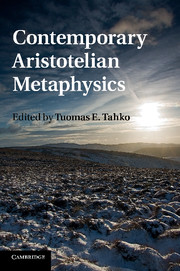Book contents
- Frontmatter
- Contents
- Contributors
- Preface
- Introduction
- Chapter 1 What is metaphysics?
- Chapter 2 In defence of Aristotelian metaphysics
- Chapter 3 Existence and quantification reconsidered
- Chapter 4 Identity, quantification, and number
- Chapter 5 Ontological categories
- Chapter 6 Are any kinds ontologically fundamental?
- Chapter 7 Are four categories two too many?
- Chapter 8 Four categories – and more
- Chapter 9 Neo-Aristotelianism and substance
- Chapter 10 Developmental potential
- Chapter 11 The origin of life and the definition of life
- Chapter 12 Essence, necessity, and explanation
- Chapter 13 No potency without actuality: the case of graph theory
- Chapter 14 A neo-Aristotelian substance ontology: neither relational nor constituent
- References
- Index
Introduction
Published online by Cambridge University Press: 05 December 2011
- Frontmatter
- Contents
- Contributors
- Preface
- Introduction
- Chapter 1 What is metaphysics?
- Chapter 2 In defence of Aristotelian metaphysics
- Chapter 3 Existence and quantification reconsidered
- Chapter 4 Identity, quantification, and number
- Chapter 5 Ontological categories
- Chapter 6 Are any kinds ontologically fundamental?
- Chapter 7 Are four categories two too many?
- Chapter 8 Four categories – and more
- Chapter 9 Neo-Aristotelianism and substance
- Chapter 10 Developmental potential
- Chapter 11 The origin of life and the definition of life
- Chapter 12 Essence, necessity, and explanation
- Chapter 13 No potency without actuality: the case of graph theory
- Chapter 14 A neo-Aristotelian substance ontology: neither relational nor constituent
- References
- Index
Summary
One might raise the question whether the science of being qua beingis to be regarded as universal or not. Each of the mathematical sciences deals with some one determinate class of things, but universal mathematics applies alike to all. Now if natural substances are the first of existing things, natural science must be the first of sciences; but if there is another entity and substance, separable and unmovable, the science of it must be different and prior to natural science, and universal because it is prior.
(Aristotle, Metaphysics 1064b6–13)The expression ‘Aristotelian metaphysics’ suggests a commitment to the view that there is a study that is different and prior to natural science. Metaphysics is ‘first philosophy’, the core and beginning of any and all philosophical and rational inquiry into the world. The task of metaphysics is not to serve science or to clear conceptual muddles, but to study being and the fundamental structure of reality at the most general level. This view competes with recent deflationary conception about the methods and aims of metaphysics. One approach that has a strong foothold in this field could be called ‘Quinean’. According to a Quinean, ‘naturalized’ conception, metaphysics is continuous with science in its methods and aims. Questions about the nature of reality are to be answered by application of ‘regimented theory’. Philosophers such as the contributors to this volume, who in various respects may be described as ‘neo-Aristotelian’, continue to regard metaphysics as an inquiry distinct from natural science. They deploy what they regard as distinctly philosophical, often a priori, methods to discuss metaphysical concepts like essence, substance, dependence, potential, ground, and other categories of being and relations among beings described by language that is not purely extensional. We may also contrast Aristotelian metaphysics with Kantian metaphysics: categories are central to both, but in Aristotelian metaphysics they are categories of being whereas in Kantian metaphysics they are categories of understanding.
There has recently arisen a discussion of ‘metametaphysics’, a discussion of the methods and foundations of metaphysical inquiry. The best example is the anthology edited by Chalmers, Manley, and Wasserman (2009), but James Ladyman and Don Ross (2007) as well as Timothy Williamson (2007) have also made influential contributions to the topic. One important theme in this recent literature, highlighted especially in Ladyman and Ross (2007), is the relationship between science and metaphysics. There is a growing concern that metaphysics fails to take into account recent developments in science or does so in a misguided manner. Understandably, this is something that philosophers sympathetic to the Quinean conception of metaphysics will find alarming. I think that Aristotelian metaphysicians should also be concerned, but the underlying assumption that is sometimes found in this approach is equally troubling, namely, that metaphysics needs to be naturalized, and that metaphysical inquiry is secondary to empirical inquiry. One effect of some contributions to this volume is to question that assumption and to suggest an alternative methodology inspired by Aristotle. Only some of the contributions deal with methodological matters explicitly, but the volume as a whole exemplifies the work of philosophers whose approach to metaphysics is broadly Aristotelian.
- Type
- Chapter
- Information
- Contemporary Aristotelian Metaphysics , pp. 1 - 7Publisher: Cambridge University PressPrint publication year: 2011



